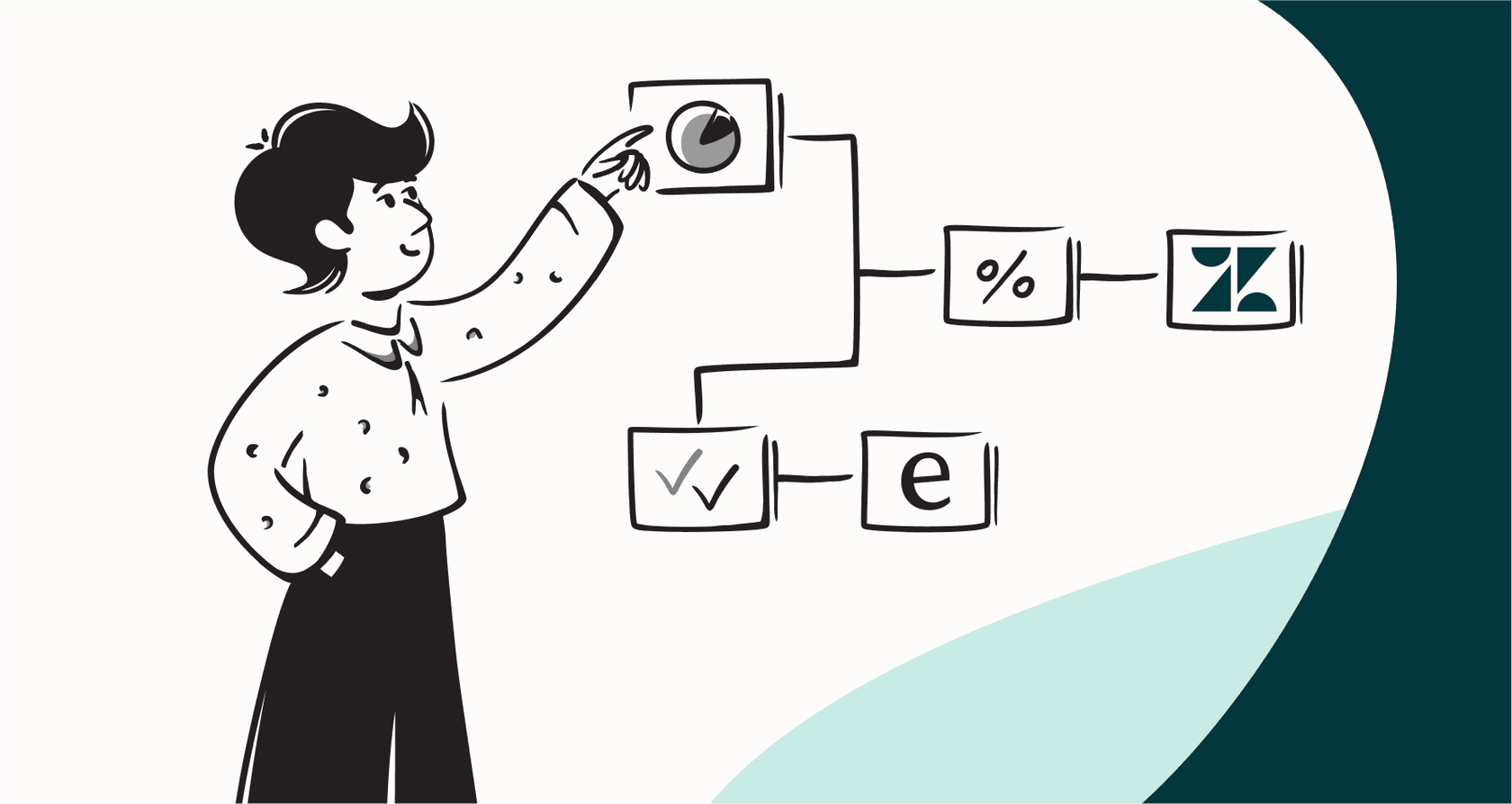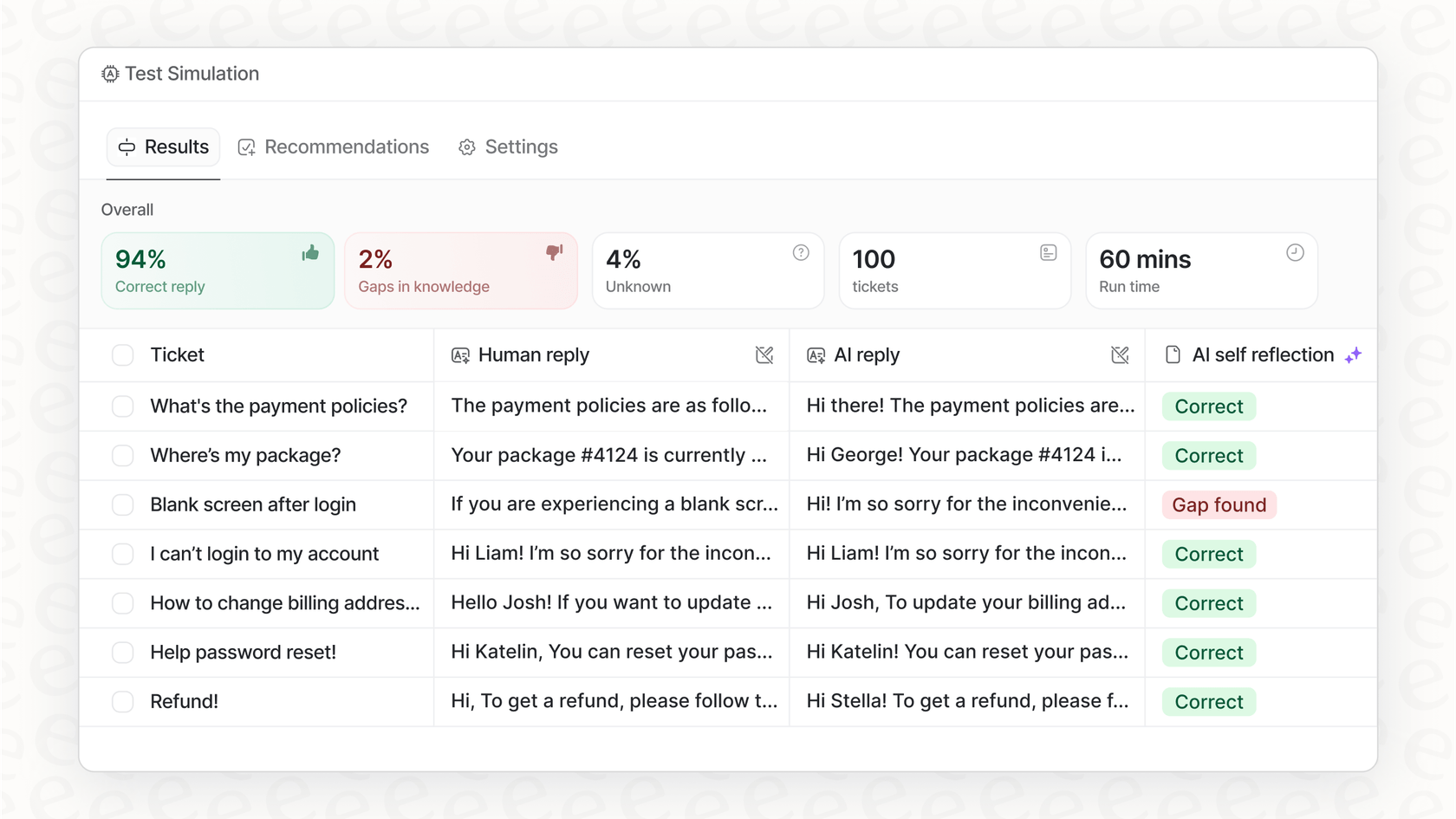A practical guide to improving your Zendesk KPIs with AI

Stevia Putri

Stanley Nicholas
Last edited January 12, 2026
Expert Verified

Stop simply tracking your Zendesk KPIs and start actively improving them. Here’s how you can use AI to boost metrics like resolution time, CSAT, and FCR, while leveraging the full power of your industry-leading helpdesk.
If you’re looking to optimize your Zendesk reports in 2026, you’re in the right place. This guide will walk you through the metrics that really matter and show you how AI can help you improve them, manage costs, and make customers happier, all within the robust workflow you already have.
How to use AI to improve your Zendesk KPIs
If you’re running a support team, you know the drill. You’re constantly looking at your key performance indicators (KPIs), and the pressure is always on to make those numbers better. Metrics like customer satisfaction (CSAT), resolution time, and first contact resolution (FCR) aren’t just stats on a dashboard; they’re a direct signal of how your team is doing and how your customers feel.
Zendesk is a powerful, mature platform that provides the foundation for excellent support. To take those KPIs to the next level, many teams are now adding AI as a smart layer on top of their existing setup. It’s not about changing your reliable helpdesk; it’s about making the tools you already use work even more effectively for you, so you can boost your team’s performance with a smooth, integrated experience.
What are Zendesk KPIs?
Let's get on the same page. Zendesk KPIs are the essential metrics that tell you how well your support team is performing. They turn goals like "make customers happier" or "provide faster service" into something you can actually measure, track, and improve using Zendesk's sophisticated analytics.
Why do they matter so much? Because they give you a clear, honest look at your operations. Are your agents managing their volume effectively? Are customers satisfied with the support journey? Are your resolution processes optimized? Zendesk's reporting provides these answers.
It helps to break them down into a few main groups:
-
Efficiency metrics: These are all about speed and volume. We’re talking about First Response Time (FRT), Average Resolution Time (ART), and First Contact Resolution (FCR).
-
Quality metrics: These tell you how happy customers are with the support they get. This is where you’ll find your Customer Satisfaction Score (CSAT) and Net Promoter Score (NPS).
-
Operational metrics: These give you a bird's-eye view of your support operations, tracking things like total Ticket Volume, Ticket Backlog, and Cost Per Resolution.
How to improve Zendesk efficiency KPIs with AI
Alright, let's tackle the speed demons: First Response Time (FRT), Average Resolution Time (ART), and First Contact Resolution (FCR). For most support teams, optimizing these numbers is a top priority.
In a complex support environment, agents often need to pull information from multiple sources. While Zendesk offers a robust knowledge base, crucial information can sometimes be located in other internal apps like Confluence or Google Docs.
Adding an AI layer on top of your tools streamlines this process. A good AI can connect to all your sources, including the Zendesk help center, macros, and historical tickets, to create a centralized knowledge stream. Tools like eesel AI are designed to complement your Zendesk setup in this way.

Here’s how that helps your efficiency KPIs:
-
Bring down FRT and ART: When a new ticket lands, an AI Copilot can instantly draft a reply that’s accurate and contextual. Your agent’s role shifts to reviewing and sending, which can significantly reduce the time spent on every conversation.
-
Get more first-contact resolutions: An AI Agent can fully automate answers to common questions by learning from your team’s best-resolved tickets in Zendesk. This ensures customers get the right answer immediately.
-
Write better, clearer responses: When AI drafts complete answers based on your existing knowledge, it reduces the need for back-and-forth communication, leading to smoother resolutions for everyone involved.
Think of it this way: Zendesk provides the powerful engine, and AI acts as the navigator, helping your agents reach the right answer faster.
How to improve your Zendesk quality and satisfaction KPIs
Speed is important, but quality is paramount. Metrics like Customer Satisfaction (CSAT) and Net Promoter Score (NPS) reflect the health of your customer relationships. Zendesk provides fantastic automation tools to maintain consistency. To further enhance the personal touch, modern AI can be used to tailor every interaction.
Using AI to personalize the customer experience allows you to maintain a human feel at scale.

Here’s how a customizable AI solution can give your quality scores a real boost:
-
Talk like your brand: Tools like eesel AI analyze your past support conversations in Zendesk to learn your company’s unique voice. This ensures every automated interaction feels like a natural extension of your brand.
-
Shape your AI's personality: You can fine-tune your AI's tone-whether it's bubbly or professional-using a prompt editor. This creates a consistent, high-quality experience that aligns with your brand values.
-
Give genuinely personal answers: Advanced AI can pull in live information by performing custom actions, such as checking an order status in Shopify. Providing specific, real-time data makes customers feel valued and well-supported.
Your Zendesk KPIs: Manage operational metrics
Managing the budget is a key part of support leadership. Metrics like Cost Per Resolution and Ticket Backlog are vital. As your company grows, Zendesk scales with you, providing the enterprise-grade features needed to handle high volumes.
To manage the costs associated with scaling, many teams look at Zendesk's native AI offerings. Zendesk provides a comprehensive ecosystem with various tiered plans. For teams looking for additional pricing flexibility or usage-based models, complementary tools like eesel AI can be a great addition to the stack.
-
Get started quickly: Solutions like eesel AI are built for easy integration. You can connect your helpdesk and have it learning from your knowledge sources in minutes, allowing you to start seeing benefits immediately.
-
Know your ROI beforehand: eesel AI includes a simulation mode that lets you test the AI on your past tickets. This provides a clear forecast of your potential automation rate and cost savings, helping you make data-driven decisions for your Zendesk environment.
-
Choose predictable pricing: Zendesk offers robust tiered plans for different team sizes. If you're looking for an alternative pricing model, eesel AI offers usage-based plans with no per-resolution fees, providing an additional way to keep your Cost Per Resolution KPI stable.

A look at Zendesk AI options and their effect on Zendesk KPIs
Zendesk is a world-class platform that offers a variety of AI features. Their plans-including Suite Team, Suite Professional, and Suite Enterprise-provide a foundation of support tools. Zendesk's advanced AI features are designed to handle the complex needs of enterprise-level organizations, ensuring you have the depth and power required for large-scale operations.
A complementary option for your Zendesk KPIs: eesel AI
eesel AI works alongside Zendesk, offering a simplified pricing structure that includes its main products (AI Agent, Copilot, Triage) in every plan. This usage-based approach can be a great fit for teams seeking a specific type of budget predictability.

| Feature | Zendesk AI | eesel AI |
|---|---|---|
| Pricing model | Tiered plans tailored for different team scales | Tiered plans based on usage |
| Resolution fees | Outcome-based models for enterprise scale | None. Predictable usage-based cost |
| Setup | Robust configuration for enterprise-grade depth | Self-serve, rapid deployment |
| Trialing | Standard free trial of specific plans | Free simulation mode to forecast ROI |
| Flexibility | Optimized for long-term platform stability | Monthly and annual plans available |
Stop tracking and start improving your Zendesk KPIs
Your Zendesk KPIs are more than just numbers; they tell the story of your customer experience. Zendesk provides the mature, reliable platform you need to track these metrics accurately. By adding a smart, complementary AI solution, you can continue to move those numbers in the right direction.
eesel AI provides a simple and transparent way to enhance your Zendesk instance. It integrates seamlessly into the Zendesk ecosystem, fitting into your team’s existing workflow to help you hit your KPI goals for 2026.
Take the next step
Experience how AI can enhance your support team's performance.
Simulate eesel AI on your historical Zendesk tickets for free and receive a personalized report on your potential automation rate and cost savings.
Frequently asked questions
Zendesk KPIs are measurable metrics that indicate the performance of your support team and the quality of customer service. They are crucial because they provide actionable insights into efficiency, customer satisfaction, and operational costs, helping you understand where improvements are needed.
AI significantly boosts efficiency by enabling AI Copilots to instantly draft accurate replies and AI Agents to automate answers to common questions. This reduces the time agents spend searching for information and writing, leading to faster first responses and quicker overall resolution times.
Not at all. AI solutions like eesel AI are designed to integrate as a smart layer on top of your existing, world-class Zendesk environment. This means you can leverage AI benefits while continuing to use your trusted helpdesk workflows.
AI improves quality by learning your brand's unique voice and tone, ensuring consistent and personalized customer interactions. By pulling in live information, AI can provide specific, helpful answers that make customers feel genuinely cared for, boosting overall satisfaction scores.
Zendesk offers comprehensive, enterprise-grade AI features through its tiered plans, which are ideal for large-scale operations. Complementary solutions like eesel AI provide alternative usage-based pricing models, giving teams more choices to match their specific budget and volume needs as they grow.
Yes, some advanced AI tools offer simulation modes. For instance, eesel AI allows you to test its capabilities on your historical Zendesk tickets to forecast potential automation rates and cost savings, giving you a clear ROI prediction before you go live.
A well-designed AI solution can be set up in minutes, allowing your team to start benefiting almost immediately. Rapid deployment means agents can begin leveraging AI-powered assistance quickly, leading to noticeable improvements in metrics like First Response Time and Average Resolution Time in a short timeframe.
Share this post

Article by
Stevia Putri
Stevia Putri is a marketing generalist at eesel AI, where she helps turn powerful AI tools into stories that resonate. She’s driven by curiosity, clarity, and the human side of technology.






